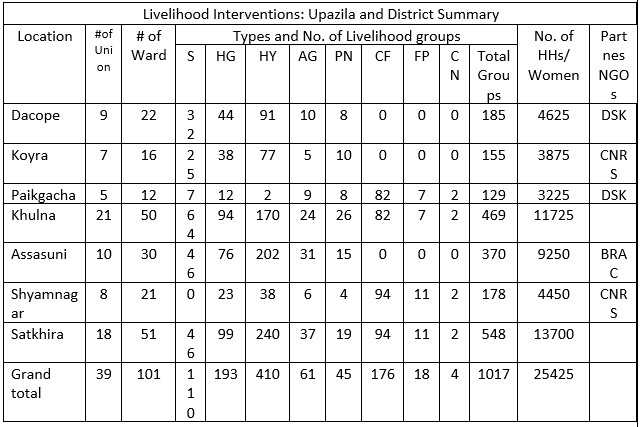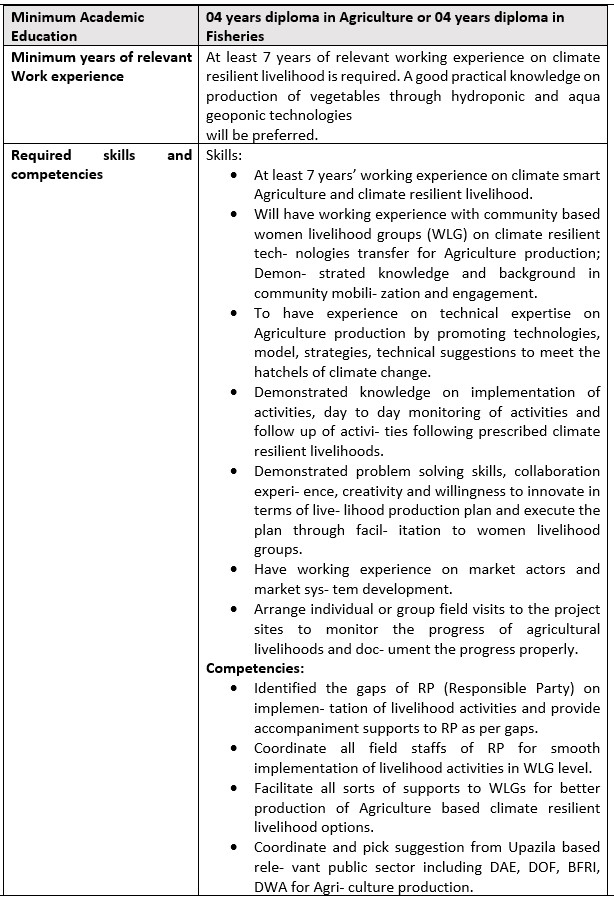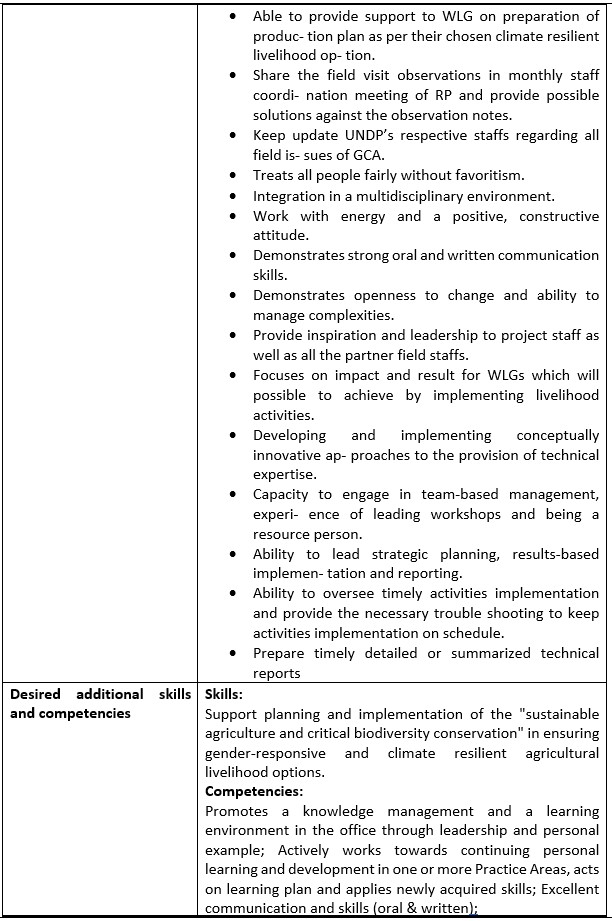Upazila Agriculture/ Fisheries Officer, GCA Project
Contractual Posted 2 years ago Expired -762 days ago Apply before: Sep 7, 2023Job Context
Duty Station: Khulna and Satkhira district (Dacope, Koyra, Paikgacha, Assasuni, Shyamnagar Upazilas in the Unions)
Contract Duration: 3.5 Months (Possibility of extension)
Contract Type: Contract with E-Zone
Contract Start Date: 15 September 2023 to 31 December 2023
Reporting to: Project Coordination Specialist, GCA
A. Background:
Climate change, manifesting in the form of intensified cyclones, storm surges, and sea-level rise (SLR), is accelerating saltwater intrusion into the freshwater resources of the coastal belt of Bangla-desh. Climate change-induced soil and water salinity is projected to adversely impact freshwater dependent agricultural livelihoods (leading to loss of productivity or livelihoods) as well as the avail-ability and quality of drinking water in the vulnerable coastal communities. Among the vulnerable coastal communities, the women and socio-economically marginalized groups such as Indigenous groups are more vulnerable given their specific livelihood circumstances, their socio-political isolation perpetuated by unequal power dynamics, and related information asymmetry and constraint in decision making processes.
A large portion of the coastal population of Bangladesh is highly exposed to climate change impacts. Particularly, climate-induced increases in the salinity of soil and freshwater aquifers (through sea level rise and cyclone-driven saltwater inundations) pose a significant threat to agriculture-based livelihoods. Both Khulna and Satkhira experience extreme and increasingly common weather phe-nomena such as tropical cyclones, storm surges, floods and droughts on regular basis. These events severely impact the agriculture sector, drinking water supply, homes and infrastructure in both dis-tricts, putting people’s lives, livelihoods and assets at risk. The vulnerability of coastal communities to these changes in their environment is shaped by the topography, by virtue of being low-lying and pervaded by river networks, due to pervasive poverty, and due to limited enabling environ-ment to allow the shift towards alternative, climate change resilient livelihoods. Between 16 and 35 percent of people living in Khulna and Satkhira are extremely poor. Gender inequality prevails in these districts through various social and cultural norms that shape women’s day-to-day activities as well as their capacity to adapt to climate change. For example, women have less decision-making power within the household and the workplace and are expected to manage the household and care for the family. Compounding these factors, climate change aggravates the burden of unpaid care work, creating a cycle, which under-mines their climate change resilience.
The project is targeted to support an estimated 245,516 people directly from 56,264 households including 579 Indigenous Peoples/Ethnic Minority households (0.19% of the total households) and seeks to offer targeted support to women and adolescent girls in two coastal districts - Khulna and Satkhira in Bangladesh, by-
· # Providing skills training and assets for a selected number of fisheries and agriculture-based climate-resilient livelihoods and promote market linkages for these livelihood options.
· # Providing potable water solutions for a selected number of most salinity-affected wards within the districts, not currently covered by other interventions, through Rainwater Har-vesting System (RWHS) at the institutional, community and household levels and pond-based system with filtration treatment technologies at the community level; and finally
· # Strengthening institutional capacity, knowledge and learning on the climate-risk informed management of livelihoods and drinking water security.
By improving the water security and livelihood options of women in the target districts, the project aims for gender-responsive results regarding women’s access to resources and decision-making power and support women in taking the lead in building community adaptive capacity.
The project has already identified 8 livelihood options as gender responsive and climate change re-silient livelihoods. These came from a long list of 38 livelihood options gained from community-level assessments and the assessment of the best practices in comparable settings down to 13 consider-ing salinity and cyclone resilience and fresh water dependency, followed by a comprehensive screening of those options with the different aspects of the livelihood options- (i) profitability and market potential/value chain access; (ii) gender responsiveness and transformation potential; (iii) socio-economic considerations and community acceptance; and (iv) environmental impacts.
GCA project’s selected 8 livelihood options are - (i) crab farming and trading (ii) crab nursery (iii) aq-ua-geoponics (iv) hydroponics (v) plant nursery (vi) sesame cultivation (vii) homestead gardening (viii) crab and fish feed processing. A total of 1017 groups (details breakdown are provided in Table 1) have been formed with 10-35 members in each group and each group will be trained on 3 liveli-hood options out of eight and will be given input support for 3 production cycles for 2 selected live-lihood options based on beneficiary preference.
Table 1: Upazila and livelihood wise breakdown of the project targeted beneficiaries

NB: S=Sesame, HG=Homestead Gardening, HY=Hydroponics, AG=Aqua Geoponics, PN=Plant Nursery, CN=Crab Farming, FP= Fish Feed Processing, CN=Crab Nursery
The Ministry of Woman and Children’s Affairs (MoWCA) leads the project and UN Agency serves as the key technical partner. For the livelihood component, Department of Women Affairs (DWA) and for safe and resilient drinking water provision interventions Department of Public Health and Engineer-ing (DPHE) serves as the lead implementing partners. Other GoB institutions like Bangladesh Fisher-ies Research Institute (BFRI), Ministry of Fisheries and Livestock (MoFL), Local Government Institu-tions (LGIs) as well as full participation of non-government organizations and community members, including marginalized groups in the intervention areas. Livelihood support for the project will be facilitated by Responsible Party NGOs (BRAC, CNRS and DSK) for 5 Upazilas.
The assignment will strengthen the capacity of Output 1 of GCA project. The Agriculturist will sup-port the day-to-day field level implementation of Agricultural livelihood interventions. Also, this position will reflect with; climate extreme impacts and adaptation strategies, group base livelihood action plan, risk and mitigation plan of implementation and monthly meeting and report and the new scope of climate resilience livelihoods capturing. It will guide the project livelihood component, ensuring equal distribution of project benefits among different socio-economic beneficiary groups, especially for women and adolescence girls, ensure project interventions from gender lense and perspective, help making livelihood and project interventions gender-responsive and gender trans-formative.
B. Project Strategy:
Firstly, the project will address the barriers related to low awareness of and access to resilient live-lihood practices, lack of technical and financial capacities, and limited adoption and scalability hin-dering the small-scale farmers, fishers, and agro-laborers to diversify to climate-resilient livelihoods and implement adaptive livelihood strategies. Additionally, the proposed project will build the ca-pacities of beneficiaries to implement climate risk reduction strategies (including through improved last-mile dissemination of EWs) and continually adapt and safeguard their livelihoods and assets as climate risks evolve.
Secondly, the project will address the barriers of limited understanding and, technical know-how and the constraints on vulnerable communities to safeguard against the deterioration of their drinking water resources due to climate change-induced salinity. Particularly, the project supports women and girls who are burdened with providing water for their families and additionally suffer from drinking water insecurity. Community and GoB resources are leveraged to ensure sustained O&M of the resilient water supply systems, including a commitment to co-manage the systems be-yond the project lifetime.
Finally, UN Agency resources will be invested in building technical and coordination capacities of two (2) implementing ministries (Ministry of Women and Children Affairs and Local Government Division); facilitating knowledge generation and exchange; and establishing learning frameworks to sustain, replicate, and scale resilient livelihood and drinking water solutions for coastal communities.
C. Institutional Arrangement
Project Coordinator, “Enhancing adaptive capacities of coastal communities, especially women, to cope with climate change induced salinity” Project.
D. Minimum Qualifications



E. Objectives of the Assignment:
To be responsible for the agricultural livelihood’s activities of GCA project in Khulna and Satkhira district. This position works directly with our 25,425 Women beneficiaries, 819 Women Agricultural Livelihood Groups (WALGs) on a day-to-day basis on agricultural livelihood activities and motivates the beneficiaries to look at agriculture livelihood as a business which will be extended up to 43,000 beneficiaries with GoB co-financing. It requires a solid technical background and training experience and ability to interact with government officers, private sector players, and other NGO partners. This position requires a direct commercial sector and field level experience. GCA project also strongly expect to explore the new, innovative climate resilient agricultural livelihoods with the help and support of this position.
F. Scope Of Work and Key Tasks:
Scope of Work:
In liaison with other project staff, the Upazila Agriculture/Fisheries Officer will develop an effective and coherent plan for the proposed agricultural livelihood; [Sesame. Hydroponic, Homestead gardening, Plant nursery] of GCA project. This position will ensure the effective and successful planning, budgeting, management and implementation, capacity building of the local communities to manage their sustainably, develop mutually beneficial partnerships with relevant government departments, NGOs and other institutions involved in the adaption of agricultural livelihoods in the project area.
This position will work to identify and support WALGs groups in day-to-day activities related Ag. LH in the project area, suitable monitoring indicators [both process and impact] for the agriculture LH, Establish an umbrella farmer network; one in each of the ward. S/he will strengthen the agri-business elements and value chains and help to develop a groupwise livelihood business plan for agricultural livelihood. The business plan should also consider the barriers in place and how the plan will overcome the barriers. Will help to produce a case-based storyline on success of the farmers or native communities to fully capture the natural story of the agricultural livelihoods.
This position will be contributed towards process of innovation of agricultural/ fisheries livelihood. Lead the whole work with the NGOs and to establish the scope and methodology for conducting the task (under the overall scope of work). Lead the development of strategies and action plans for agriculture commercialization in the selected area (GCA working Upazila area). Prepare and monitor a plan for capacity building through mentoring and facilitated learning by doing associated with implementing the technical assistance. The position holder will assess the applicability of prevailing climate vulnerability assessments and disaster risk management measures as GCA relate to development of agri-business value chains of the selected commodities. S/He have to establish the plan on production of vegetables through hydroponic and aqua geoponic technologies.
Job Responsibilities
I. Key Deliverables:
Following are the key deliverables from the position holder.
- Quality check of basic training of 1017 WLGs on 08 climate resilient livelihood options.
- Maintain coordination with RPs to provide inputs to 1017 WLGs for 1st and 2nd production cycle.
- Pay regular monitoring, follow up and advice to 1017 WLGs to implement the livelihood activities.
- Facilitate RPs to form union based PPI platform in 101 wards under 39 unions and establish connection between WLGs and PPI platform.
- Find out the gaps on implementation of activities, input sourcing from local suppliers and linkage with market actors and provide possible solutions to RPs.
- Establish the target no. of livelihood options in WLG level which have the target of each RP of each Upazila.
- Facilitate RP to mobilize WLGs for smooth operation of production tasks of climate resilient livelihood options.
- Reporting and tools development for the need of any assessment of project.
- Establishment of crab hatchery through proper guidance and leadership.
- Review different training manual on adaptive livelihoods, financial inclusion, business plan- ning, value chain and market linkages.
- Provide appropriate accompaniment support to RPs and UNDP staffs on quality implemen- tation of intervention of livelihood component.
- Close coordination with all type of stakeholders including GoB.
- Guiding the RPs for accessing to finance institute and market of women livelihood groups.
- Guiding RP member to form PPI platform.
J. Communication channel and progress controls
The Upazila Agriculture/ Fisheries Officer will report directly to the Programme Coordinator, GCA Project and day to day technical guidance will be provided by the Livelihood Expert of the project. Relevant UNDP Country Office Programme Manager and National Project Director (NPD) will be responsible for overall strategic guidance. The progress will be monitored based on the timelines and milestones indicated and agreed in the agreement.
K. Eligibility & Qualification criteria
The Assistant Agriculture Officer should have the following minimum eligibility criteria:
# 04 years diploma in Agriculture or 04 Years diploma in Fisharies. At least 7 years of relevant working experience in adaptive livelihood is required.
# Extensive experience in projects promoting livelihood interventions; Demonstrated knowledge and background in community mobilization and engagement.
# Demonstrated problem solving skills, collaboration experience, creativity and willingness to innovate.
# At least 7 years of relevant working experience on climate resilient livelihood is required. A good practical knowledge on production of vegetables through hydroponic and aqua geoponic technologies will be preferred.
L. Responsiblities of the assistant agriculture officer regarding cost component
To produce deliverables stipulated in the ToR, UNDP will bear all necessary costs relating to the required fees of the assignment, DSAs, materials to use at field, travel costs for field etc. UNDP will bliable to arrange any travel, required in this assignment.
M. Identification of the Risk and Mitigation Plan
The position holder must identify key risks on implementation of livelihood intervention and outline how it will mitigate against implementing activities. Unclear understanding about this implementation could be one of the potential risks. To mitigate this risk, the project/UNDP will organize briefing sessions with the selected personnel and supporting team members to clarify the objectives, activities, and outputs of this assignment.
Compensation and Other Benefits
N. Supervision and Performance Evaluation
The Upazila Agriculture/ Fisheries Officer will report to the GCA Project Coordinator, who will also carry out a performance evaluation at the end of the assignment. The work will also be guided and reviewed by the PC of the project.
O. Consultancy Cost:
The Officers’ salary range will be between BDT 75,000-80,000 per month as a consolidated package which includes lumpsum travel cost in duty station.
Additional Info
Key Tasks
· Identified the gaps of RP (Responsible Party) on implementation of livelihood activities and provide accompaniment supports to RP as per gaps.
· Coordinate all field staffs of RP for smooth implementation of livelihood activities in WLG level.
· Facilitate all sorts of supports to WLGs for better production of Agriculture based climate re- silient livelihood options.
· Coordinate and pick suggestion from Upazila based relevant public sector including DAE, DOF, BFRI, DWA for Agriculture production.
· Able to provide support to WLG on preparation of production plan as per their chosen climate resilient livelihood option.
· Share the field visit observations in monthly staff coordination meeting of RP and provide pos- sible solutions against the observation notes.
· Developing and implementing conceptually innovative approaches to the provision of tech- nical expertise.
· Ability to oversee timely activities implementation and provide the necessary trouble shooting to keep activities implementation on schedule.
· Prepare timely detailed or summarized technical reports.
G. Duration of assignment, parties involved and places of implementation
Duration of the assignment will be Nine (09) months from the date of the contract issuance, as per the proposed position. The duty station will be any working Upazila of GCA, Bangladesh. The position holder also needs to participate in number of virtual and in-person meetings (with GCA staffs and key stakeholders at different stage of the deliverable development) and conduct field missions in working Unions of GCA.
H. Criteria for Selection of the Best Offer/ Technical Evaluation Criteria:
The criteria which shall serve as basis for evaluating offers will be:
# Educational qualification.
# Relevant work experience.
# Year of experience.
# Partnership management.
· # Knowledge on Hydroponics, Aqua geoponics, Crab nursery and Crab farming.
# Knowledge on gender responsiveness and gender transformation.
# Knowledge on climate resilient technologies transfer of Agriculture and Aquaculture based livelihoods.
# Mobilization of community-based women groups
Special Instructions
This position is open for Bangladeshi Nationals only. All candidates, irrespective of gender, religious and ethnic backgrounds can apply for the vacancies.
The UN Agency prides itself as fostering a multicultural and harmonious work environment, guaranteed by a zero-tolerance policy on sexual exploitation and abuse, and on any kind of harassment, including sexual harassment and discrimination. All selected consultants will undergo rigorous reference and background checks.
Candidates with the required profile and proven experience, who meet these qualifications, are invited to submit their application in English clearly mentioning the Job Title along with a meaningful cover letter, updated CV, recent PP size photograph to E-Zone Job Portal.
Last Date of Application: 7 September, 2023
No phone calls please. Only short-listed candidates will be contacted. All applications will be treated according to the merit and with strict confidentiality.







